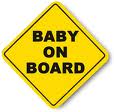 Not being a parent myself, I find them interesting as objects of psychological study. And one thing that has always puzzled me is this enthusiasm for sticking signs on your car telling people that you are transporting your offspring.
Not being a parent myself, I find them interesting as objects of psychological study. And one thing that has always puzzled me is this enthusiasm for sticking signs on your car telling people that you are transporting your offspring.
Why do people do this?
Is it just pride in your reproductive abilities? A badge of club membership to win you support from other parents? A warning that you may suddenly swerve because somebody has just pulled your hair or screamed in your ear?
Or is it, perhaps, something rather more sinister and insulting – an implication that other drivers – like me – may have no qualms about endangering your life, but will be inspired to take pity on your innocent sprog and so curb their otherwise naturally reckless driving?
Can anyone enlighten me?
I think they were originally intended for the emergency services, so in the event of a car crash they would thoroughly search the wreckage/area for the baby. Of course, the signs very soon took on other more general roles – including all the things you mention, I suspect.
The scary thing for me, which happens all too often, is seeing these badges in the backs of speeding cars piloted by telephone-toting drivers. It’s one thing to be a reckless driver, but to also boast about the fact you’ve got a helpless child in the back… Which in itself is interesting as there have been a few studies lately showing how much children learn to drive from the back seat. You can, to a substantial extent, predict a novice driver’s recklessness from what they saw their parents do over the past 17 years.
I’ve also seen ‘mother-to-be on board’. Baffling.
“please drive carefully and try hard not to hit/crash into my car because you will not only kill me but my kid/s as well”
Is what I like to think it mean
My first wife bought one of these in the mid 80’s, shortly after our daughter was born. I joked that it was to keep all of the hot California girls from hitting on me. Well, it worked…damn her.
The funniest car sign I’ve seen (well probably the ONLY funny one I’ve ever seen) was “It’s OK you can hit me, no baby onboard”.